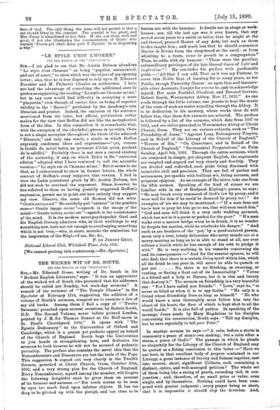"LE STYLE C'EST L'HOMME."
f To THE EDITOR OF THE "SPECTATOR."]
SIR,—I am glad to see that Mr. Austin Dobson abandons "Le style c'est l'homme " as being "popular, uncanonical, and out of court," to show which was the object of my opening letter ; also, that he is less disposed to rely upon M. Edonard Fournier and M. Philarete Chasles as authorities. I have not had the advantage of consulting the additional ones he quotes as supporting the reading " Le style eat l'homme mime," but in any ease would find difficulty in accepting a mere "plaquette," even though of earlier date. as being of superior validity to the " Recueil" published by the Academy's own librarian and printer. Indeed, the omission of the sentence mentioned from the later, but official, publication rather makes for the view that Buffon did not like the metaphorical form of the idea. In this connection it is remarkable that, with the exception of the (doubtful) phrase in question, there is not a single metaphor throughout the whole of the admired " Discours," and only one simile, a simile in which Buffon expressly condemns ideas and expressions—" qui, comme la feuille du metal battu, ne prennent d'eclat qn'en perdant de la solidite." Probably there is not now a record existing of the authority, if any, on which Didot in His "corrected edition" adopted what I have ventured to call the scientific version—" Le style eat de l'homme meme." But it seems to me that, as I endeavoured to show in former letters, the whole context of Buffon's essay supports that version. I had in view the Latin quotations given by Mr. Anglin Dobson, but did not wish to overload the argument. Since, however, be has referred to them as having possibly suggested Buffon's expression, permit me to point out how entirely they support my view. Observe, the same old Roman did not write " °ratio animus est." He carefully put "animus" in the genitive ease—" °ratio imago animi"—speech is the image of the mind—" Oratio vultus animi eat '—speech is the countenance of the mind. It is the modern nenropsychopathic Gaul and his English literary admirers wh'o, in their writhings to say something new, have not wit enough to avoid saying something which is not true,—who, in short, mistake the contortion for the inspiration of the Siby1.—I am, Sir, &c., P. DE JERSEY GRIM.
National Liberal Club, Whitehall Place, July 131h.
[We cannot prolong this controversy.—ED. Spectator.]






































 Previous page
Previous page